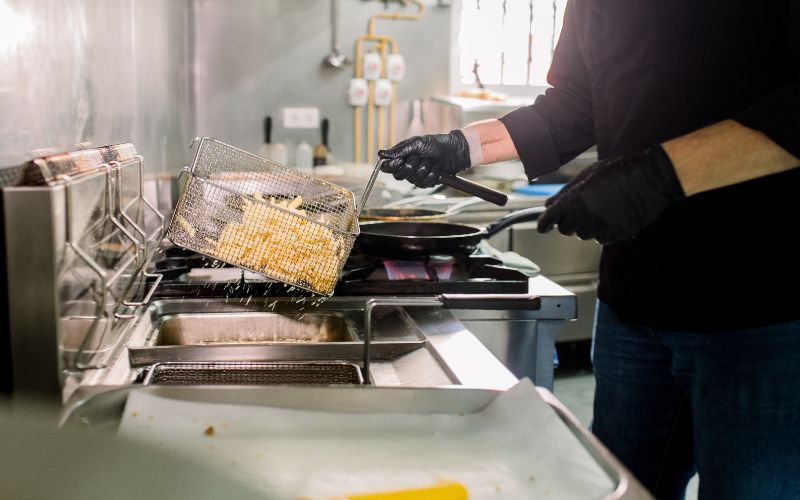Frying oil is the backbone of any commercial kitchen that serves crispy, golden perfection. But while great frying oil can elevate a dish, poor oil management can lead to off-flavours, wasted product, and unnecessary costs. The secret to working with oil is protecting your oil from the six biggest threats that shorten its lifespan and degrade food quality. If you can keep these factors under control, you’ll not only improve consistency and flavour but also reduce waste and cut down on unnecessary oil replacements. Let’s dive into the six biggest threats to frying oil—and what you can do to combat them.
1. Oxygen Exposure (Oxidation)
Why it’s a problem:
- The more your oil interacts with oxygen, the faster it breaks down. When oil oxidizes, it forms chemical compounds that lead to off-flavours, unpleasant odors, and a shorter frying lifespan
How to prevent it:
- Keep fryers covered when not in use.
- Minimize stirring, splashing, and unnecessary agitation of the oil.
- Use a filtration system and limit oil recirculation time during filtering.
2. Food Debris & Carbon Build-Up
Why it’s a problem:
- Leftover crumbs and food particles sink to the bottom of the fryer, burning over time and releasing rancid flavours into your oil. This not only affects taste but also increases foaming and darkens the oil faster.
How to prevent it:
- Skim the fryer regularly to remove food debris.
- Filter the oil daily to remove carbonized particles.
- Use high-quality frying oils with a higher smoke point to slow degradation.
3. Salt (Before Frying)
Why it’s a problem:
- Salt accelerates oxidation and breaks down oil faster, leading to a darker color and off-flavours. It also causes foam formation, which can make frying less efficient and increase splattering.
How to prevent it:
- Season after frying, not before.
- Avoid refrying foods that have already been salted.
- Keep seasoning away from open fryers to prevent cross-contamination.
4. Water & Moisture
Why it’s a problem:
- Water and oil don’t mix. Moisture introduced to hot oil causes rapid breakdown, excess splattering, and steam formation that accelerates oil degradation.
How to prevent it:
- Fully thaw frozen foods before frying.
- Pat ingredients dry to remove excess moisture before placing them in the fryer.
- Avoid overloading the fryer basket, which can lead to excess steam buildup.
5. Light Exposure
Why it’s a problem:
- Direct light, especially sunlight or bright kitchen lighting, speeds up the oxidation process, leading to oil spoilage and rancidity.
How to prevent it:
- Store oil in a cool, dark place when not in use.
- Use containers that block light (avoid clear plastic or glass).
- Keep fryer vats covered when idle to reduce exposure.
6. Excessive Heat
Why it’s a problem:
- While frying requires high temperatures, consistently overheating oil can accelerate its breakdown and cause food to cook unevenly.
How to prevent it:
- Monitor and maintain proper frying temperatures—typically between 325°F and 375°F, depending on the food.
- Calibrate fryers regularly to ensure they heat accurately.
- Turn off unused vats to prevent unnecessary heat exposure.
Better Oil, Better Business
Managing frying oil ensures high-quality food that keeps customers coming back. By minimizing exposure to these six oil-damaging factors, you’ll extend the life of your frying oil, improve flavour consistency, and maximize your return on every drop. Looking for better ways to optimize your kitchen operations? Explore our top-rated commercial fryers and oil filtration systems today.




